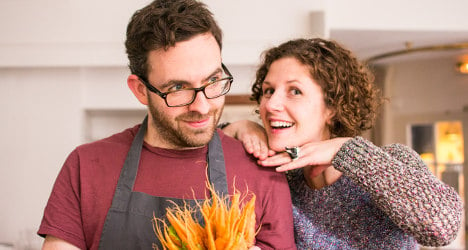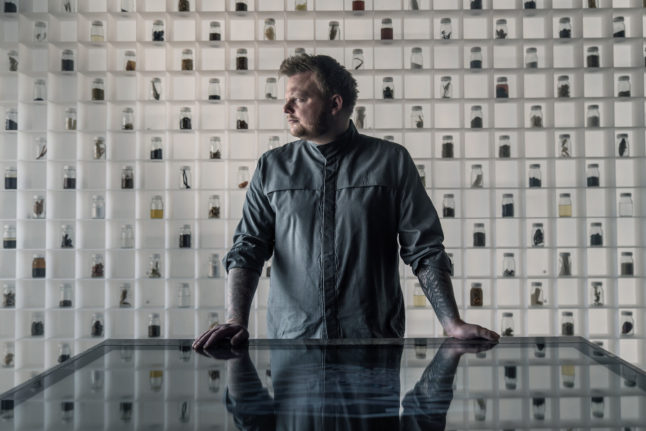When psychology graduate Laura Adrian, 30, and chef Braden Perkins, 34, moved to Paris from Seattle in 2007 they planned on staying a year at most.
Six years later, they are the proud owners of the successful Verjus wine bar and restaurant in the heart of the capital. But it hasn't been plain sailing, with endless arguments with estate agents and hours spent negotiating work permits.
They tell The Local how they earned a place for themselves on the notoriously hard-to-conquer Paris food scene.
What brought you to Paris in the first place?
My wife Laura and I had just graduated from college in the US and weren’t sure what we wanted to do with our lives. With the job market looking pretty bleak, our initial plan was just to take a year out in Paris, travel around Europe and return to the States at the end of the year.
Laura already spoke French, having spent time in Paris and Madagascar, but I spoke only what I’d call "restaurant French". In other words, I could tell the difference between duck and beef on a menu.
Shortly after we got here, I was offered a consulting job that involved importing food to the US. It wasn’t my first job to do with food: I’d also worked for a few chefs back in the US, including celebrity chef Tom Douglas.
How did you end up opening a restaurant?
When we moved to Paris in March 2007, we found it really hard to make friends. Suddenly we didn’t know anyone, and had nowhere to meet anybody either.
So we started a supper club once a month at our apartment, inviting eight or so people over for a big meal, including a handful of people from the restaurant business. They came for the social and clandestine aspect, and were pleasantly surprised by the food.
Soon, people began writing about us on their blogs and there was a massive influx of people who wanted to come to the supper club.
That’s what motivated us to open a restaurant.
Meanwhile, in our spare time, we ate out at restaurants a lot, meeting chefs and finding out about products and farmers. That helped us get a realistic sense of the market. In 2011, we opened Verjus in the 1st Arrondissement..
At the time, our family and friends thought we were crazy and were worried about us going broke.
Any teething problems?
When we started visiting agencies to look for a restaurant to buy, no one would take us seriously. This was frustrating because we actually did have the necessary funds.
The usual response from agencies was: ‘I can’t show you anything because you don’t know what you’re doing, you didn’t go to cooking school and you haven’t worked for any chefs that I’ve heard of.’
Eventually, I just ended up lying and telling them I’d gone to a top Swiss restaurant management school and worked for famous chefs. After that, they showed me everything. We must have gone through about 17 agencies and 80 properties.
Apart from that, French bureaucracy was definitely the most difficult thing. It felt like sand was constantly flowing through our fingers.
Just after we opened, we had our liquor licence revoked simply because we weren’t French, which meant we had to shut down for a few weeks. In the end, we had to ask a French friend to put the license in his name.
Was it difficult getting a working visa?
A year and a half after opening, we still weren’t legally allowed to pay ourselves salaries because we couldn’t get working visas. So, for a while, we were writing cheques for our employees while at the same time working as 'illegals' in our own restaurant.
Until a few months ago, we were working on a long-stay tourist visa normally reserved for Americans who retire here or for business people who live here but work in the US. Fortunately, we were still doing consulting work for American companies, which kept us going.
Did you encounter any resistance from French locals?
I remember being frustrated by the first articles that came out about us. Instead of being interested and excited about the restaurant, the journalists seemed very protectionist.
One French publication even had a headline like: "Paris under attack by the Americans". Recently, the same publication called us about doing a photo shoot for which they were gathering the best young chefs in Paris.
We told them we didn’t want to waste our time.
About half of our clientele at the restaurant are travellers and expats. The other half are French, but usually people who’ve travelled rather than those who think there’s something wrong with you if you don’t cook confit in the traditional way.
These days, the typical reaction we get is: "I didn’t know Americans could cook this way!" or "I didn’t know food like that existed!"
What kind of food do you serve?
Our menus are 100-percent inspired by the farmers and producers we work with and what they happen to be growing at that time.
Judging from the reviews people have written about us, I’d say that the thing that separates us most from French chefs is that we threw out the rule books a long time ago. As we see it, there’s no single way to make duck confit – we want to try 100 ways to do it. We encourage the different techniques of all our kitchen staff.
Finally, what advice would you offer other expats hoping to set up their own business in France?
Get a brilliant lawyer – it’s absolutely necessary. We were lucky because we were friends with an American ambassador who gave us the name of an incredible lawyer, Ardavan Amir-Aslani, who agreed to work for us pro bono. He told us to focus on the food and stop stressing while he took care of the legal side of things.
Verjus is located at 52 Rue de Richelieu in the 1st arrondissement. For more information and for opening times, you can visit the restaurant's website www.verjusparis.com



 Please whitelist us to continue reading.
Please whitelist us to continue reading.
Member comments